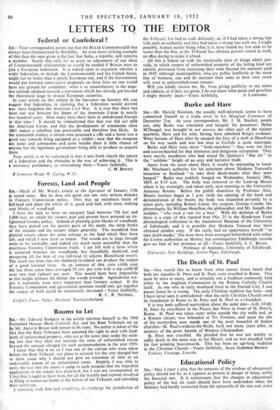LETTERS TO THE EDITOR
Federal or Confederal ?
Snt—Your correspondent points out that the- British Commonwealth has always been characterised by flexibility. An even more striking example of this than the ones given is the fact that India, a republic, still remains a member. Surely this calls for as great an adjustment of our ideas of Commonwealth relationships as would be needed if Britain were to join a European federation. It is indeed open to argument whether a wider federation, to include the Commonwealth and the United States, might not be better than a purely European one, and if the Government would put forward constructive proposals on these lines no one would have any ground for complaint ; what is so unsatisfactory is the nega- tive attitude adopted towards a movement which has already got beyond the theoretical stage in several European countries.
In your article on this subject in the Spectator on January 4th you suggest that federalists, in claiming that a federation would prevent war, have forgotten the American Civil War. It is true that there has been one war between the States of the American Union in nearly two hundred years. How many have there been in unfederated Europe in that time ? It should be remembered that that war did not split the • American Union, and that the development of armaments since 1861 makes a rebellion less practicable and therefore less likely. In the nineteenth century a citizen who possessed a rifle and a horse was a rood way towards being equipped as a soldier ; now that the weapons are tanks and submarines and atom bombs there is little chance of anyone but the legitimate government being able to produce or acquire them.
Your article is to be welcomed in that it sets forth clearly the nature of a federation and the obstacles in the way of achieving it. This is a necessary preliminary to overcoming them.—Yours- faithfully,
8 Somerset Road, W. Ealing, W.13. C. M. BOWEN.


































 Previous page
Previous page